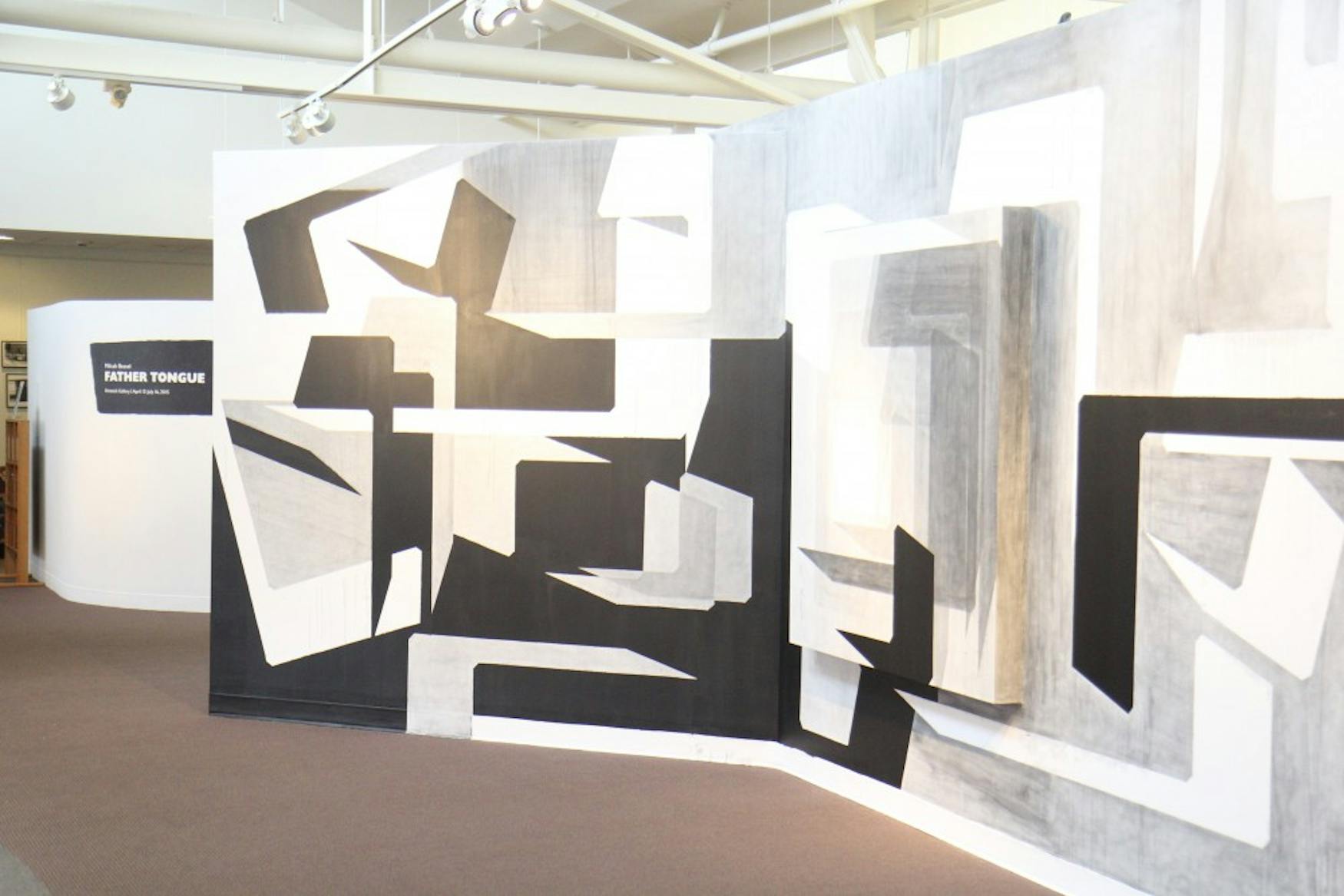Exhibit draws on artist’s childhood to highlight artistry in the Hebrew alphabet
Currently on view in the Women’s Studies Research Center Kniznick Gallery, Father Tongue portrays a unique connection between visual art and the Hebrew language. Combining themes of feminism, abstraction, space and language, the exhibit is a multidisciplinary installation that includes large-scale wall drawings, murals and a sound piece.
The artist behind the installation, Milcah Bassel, holds a postbaccalaureate certificate in studio art from Brandeis. She created the large-scale wall drawings of Father Tongue on site as the Hadassah Brandeis Institute Artist-in-Residence.
The wall drawings cover the full span of the exhibition walls and their sheer size grabs the attendees’ attention. Although the drawings appear to be made of a combination of several geometric forms due to their complexity, they are actually created from the manipulation of only five Hebrew letters. Bassel explained that she looked through the Hebrew alphabet and settled on these five letters because they all consist of exclusively right angles.
Although the drawings are divided over three walls, there is a seemingly invisible continuation guiding the viewer from wall to wall. The nature of the exhibit’s setup causes the wall drawings to be “read” from right to left, which, according to Bassel, was intentional, since Hebrew is read from right to left.
Bassel’s installation is deeply inspired by her experiences with the Hebrew alphabet. In an interview with the Justice, Bassel discussed her family’s impact on her art. Bassel recalled watching her father, a traditional Jewish scribe, meticulously writing on Torah scrolls and other scriptures. Since she was unable to read and understand the writing as a child, observing her father writing was a fundamentally visual experience. Bassel’s connection to the Hebrew alphabet only grew stronger after her family moved to Israel and Hebrew became her second language.
The balance between negative and positive space enhances the exhibit’s use of space. On the right most wall are only a few lightly shaded letters. As the drawing progresses leftward, there is an accumulation of letters with gradually darker tones, and the left most wall has only a few letters that are completely dark.
The choice to gradually increase the number of letters and use tonal variation gives the piece a commanding presence. The wall-drawings were made with only graphite and ink. This choice not only strengthens the drawings’ connection to the act of writing but also provides sharp contrasts between dark and light.
In a description accompanying the exhibit, Bassel said that she used “the creation story from Genesis to provide the framework for the installation, where light, darkness, and chaos emerge as organizing themes.”
On a separate wall, the opening lines from Genesis are printed in both English and Hebrew. Through headphones hanging opposite the drawings, viewers can listen to a sound piece that offers an interpretive recording of the beginning of Genesis.
Bassel’s art merges her Jewish cultural identity with her feminist ideals. In Brandeis’s State of the Art magazine, Bassel notes how her artwork reflects her relationship with the patriarchal tradition inherent in Hebrew scripture.
Bassel writes that the title of the piece Father Tongue is a reference to both “father culture” and “mother tongue.” “Tongue” is also a reference to “Codex Artaud,” an old art installation by prominent feminist artist Nancy Spero.
A panel on the installation explains that “[t]raditionally, Hebrew texts are scribed by men, and her actions to flip and invert the five characters are a way to reclaim them as her own as graphic and abstract forms.”
Bassel explained to the Justice that she hoped that people of different backgrounds would have differing reactions to her installation. To those who knew Hebrew, she hoped they would recognize the Hebrew letters, and for those who did not know Hebrew, she hoped they would recognize that the installation at its core is a manipulation of space and language.
A live performance of the installation will be held Sunday, April 26.



Please note All comments are eligible for publication in The Justice.